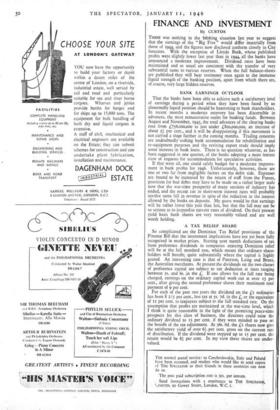FINANCE AND INVESTMENT
By CUSTOS THERE was nothing in the btnking situation last year to suggest that the earnings of the "Big Five" would differ materially from those of 1944, and the figures now disclosed conform closely to City forecasts. With the exception of Lloyds Bank, whose published profits were slightly lower last year than in 1944, all the banks have announced a moderate improvement. Dividend rates have been maintained and as usual are consistent with the transfer of very substantial sums to various reserves. When the full balance-sheets are published they will bear testimony' once again to the immense liquid strength of the banking position, apart from which there are, of course, very large hidden reserves.
BANK EARNINGS OUTLOOK
That the banks have been able to achieve such a satisfactory level of earnings during a period when they have been faced by an abnormally liquid position should be heartening to bank shareholders. In recent months a moderate recovery has been discernible in advances, the most remunerative outlet for banking funds. Between August and November, 1945, the total advances of the clearing banks rose from £756,000,000 to just under £800,000,000, an increase of about 51 per cent., and it will be disappointing if this movement is not carried a stage further in the coming months. Trading concerns are undoubtedly seeking bank accommodation for rehabilitation and re-equipment purposes and the reviving export trade should imply some increase in bank loans. There is no question whatever, as has been suggested in one quarter, of the banks adopting a more lenient view of requests for accommodation for speculative activities.
If that were all, one could safely budget for a moderate improve- ment in bank profits for 1946. Unfortunately, however, there are One or two far from negligible factors on the debit side. Expenses are bound to be increased by the return of staff from the Forces, provision for bad debts may have to be made on a rather larger scale now that the war-time prosperity of many sections of industry has ended, and the recent cut in short-term interest rates will probably involve some fall in revenue in spite of the reduction in the interest allowed by the banks on deposits. My guess would be that earnings will be rather lower this year than last, but that the fall may not be so serious as to jeopardise current rates of dividend. On their present yield bails bank shares are very reasonably valued and' are well worth holding.
A TAX RELIEF SHARE
So complicated are the Dominion Tax Relief provisions of the Finance Bill that the investment implications have not yet been fully recognised in market prices. Starting next month deductions of tax from preference dividends in companies enjoying Dominion relief will be at the full standard rate, which means that ordinary share- holders will benefit; quite substantially where the capital is highly geared. An interesting case is that of Paterson, Laing and Bruce, the Australian merchants. At present the dividends on the two classes of preference capital are subject to tax deduction at rates ranging between 55. and 6s. in the L. If one allows for the full rate being charged, earnings on the ordinary capital work out at over x5 per cent., after giving the second preference shares their maximum total payment of 9 per cent.
For each of the past two years the dividend on the LI ordinaries has been 8 2/5 per cent., less tax at 5s. 7d. in the L, or the equivalent of 12 per cent. to taxpayers subject to the full standard rate. On the assumption that profits are maintained at the war-time level, which I think is quite reasonable in the light of the promising peace-time prospects for this class of business, the directors could raise the ordinary dividend to 15 per cent. if they were minded to pass on the benefit of the tax adjustment. At 36s. 6d. the Li shares now give the satisfactory yield of over 61. per cent, gross on the current rate of distribution. If the dividend were stepped up to 15 per cent. the return would be 84 per cent. In my view these shares are under- valued.






























 Previous page
Previous page